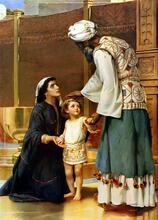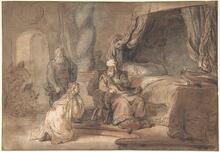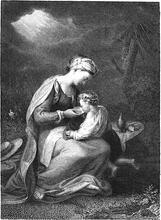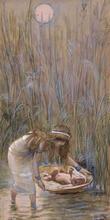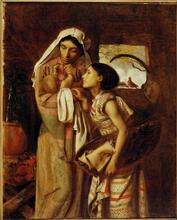Peninnah: Midrash and Aggadah
The narrative of Peninnah centers around her interactions with Hannah, as both women were married to Elkanah. Hannah is initially barren while Peninnah gives birth to several children. Different midrashic traditions tell different stories of how Peninnah treated Hannah and the nature of their relationship, and most portray Peninnah as the antagonist. Peninnah is shown irritating Hannah, although some midrashim argue that Peninnah’s actions were a result of her feeling like the least favorite wife. Peninnah is punished through her children’s deaths when Hannah’s children are born.
Background
In its depiction of Elkanah’s two wives, the Bible contrasts Peninnah, who had children, and Hannah, who was barren. The Rabbis state that Hannah was Elkanah’s first wife; after they had been married for ten years, and he saw that Hannah bore him no children, he also took Peninnah as a wife (Pesikta Rabbati 43). The Codification of basic Jewish Oral Law; edited and arranged by R. Judah ha-Nasi c. 200 C.E.Mishnah ordains that when a couple has been married for ten years without bringing any children into the world, the husband is required to take a second (or additional) wife in order to fulfill the commandment to be fruitful and multiply (M Yevamot 6:6). The A type of non-halakhic literary activitiy of the Rabbis for interpreting non-legal material according to special principles of interpretation (hermeneutical rules).midrash explains that Elkanah was compelled to marry Peninnah because of Hannah’s barrenness, which explains his preference for Hannah, his first wife.
Another tradition has the initiative to marry Peninnah coming from Hannah. Realizing that she was childless, she said to herself: If I tell Elkanah to take an additional wife, God will see that I brought a rival wife into my house, and He will remember me (Pesikta Rabbati 43). The midrash thus likens the narrative of Elkanah and Hannah with the narratives of the Patriarchs and Matriarchs (Sarah and Hagar, Rachel and Bilhah), in which the beloved wife, who is barren, initiates the taking of an additional wife in order to produce offspring.
Peninnah’s children are mentioned only briefly in the Book of Samuel (I Sam. 1:4): “Elkanah offered a sacrifice. He used to give portions to his wife Peninnah and to all her sons and daughters.” According to the midrash, she had ten sons. This tradition is based on Elkanah’s question to Hannah (v. 8): “Am I not more devoted to you than ten sons?” He thereby seeks to console Hannah by asserting that his love exceeds that of Peninnah’s ten sons (Pesikta Rabbati loc. cit.).
Tension between Hannah and Peninnah
I Sam. 1:6 tells of the tension between Peninnah and Hannah caused by the latter’s infertility: “Moreover, her rival, to make her more miserable, would taunt her that the Lord had closed her womb.” The midrash develops this theme, relating how Peninnah would vex Hannah by telling her: “Did you buy a sweater for your eldest son?” “Did you buy a shirt for your second son?” (Midrash Samuel 1:8).
According to another midrashic tradition, Peninnah would rise early in the morning and ask Hannah: “Aren’t you getting up to wash your children’s faces before they go to school?” And six hours later she would ask: “Aren’t you going to greet your children when they come home from school?” (Pesikta Rabbati loc. cit.). According to this midrashic account, Peninnah would grieve Hannah by means of ordinary everyday activities, taking pains to remind her, at all hours of the day, of the difference between them.
Yet another midrash depicts that when they would sit to eat in Shiloh and Elkanah was apportioning the offering among his sons, Peninnah would tell her husband: “Give to this son of mine his portion,” “To this son of mine you did not give his portion,” all in order to anger Hannah (Pesikta Rabbati loc. cit.). According to this portrayal, Peninnah would annoy Hannah in a roundabout manner, so that she could not be directly charged with improper behavior, while nevertheless greatly hurting her rival wife.
These different midrashim highlight the difficulty Peninnah faced living in the shadow of another woman. She knew that Hannah was Elkanah’s favorite wife, but nevertheless strove to win some recognition from him, either in their home or in the apportioning of the offerings.
The Rabbis feel that Peninnah’s unseemly conduct was the cause of Hannah finally being blessed with a child. God said to Peninnah: “You vexed Hannah [“to vex her (harimah),” I Sam. 1:6]—by your life, there is no thunder [re’amim] that is not followed by rain. I will immediately remember her [i.e., bless her with child]” (Pesikta Rabbati loc. cit.). This midrashic wordplay uses the two meanings of ra’am: (1) anger and (2) thunder. The barren wife is compared to arid soil and her being blessed with child is portrayed as the rain that falls and sates the earth, causing it to be fertile.
Peninnah’s Punishment
I Sam. 2:21 attests that the Lord took note of Hannah and “she conceived and bore three sons and two daughters.” The midrash tells that when Hannah bore her children, Peninnah was punished: Hannah would give birth to one child, and Peninnah would bury two; Hannah bore four, and Peninnah buried eight. When Hannah was pregnant with her fifth child, Peninnah feared that now she would bury her last two children. What did she do? She went to Hannah and told her: “I know that I have sinned against you. I beg you, pray for me, so that my two remaining sons will live.”
Hannah prayed to God, and said: “Please, leave her the two sons and let them live.” God responded: “By your life, they deserve to die, but since you have prayed that they live, I will call them by your name.” Thus, even though Hannah bore only five children, she says in her song (I Sam. 2:5): “While the barren woman bears seven,” for Peninnah’s two sons were reckoned as Hannah’s (Pesikta Rabbati loc. cit.). This midrashic exposition also explains the end of the verse: “While the barren woman bears seven, the mother of many is forlorn.” Hannah, who had been barren, had five children of her own and two more who were attributed to her, while Peninnah, who had given birth to many children (ten), became forlorn.
Alternative Portrayal
A completely different midrash casts Peninnah in a favorable light. Her intentions were for the sake of Heaven and she grieved Hannah so that the latter would pray to the Lord (BT Bava Batra 16a). Peninnah wanted to aid Hannah and she knew that only the latter’s prayer to God could be of help. She therefore vexed Hannah at Shiloh, thereby causing her distraught rival wife to pray fervently. Thanks to Peninnah, Hannah’s prayer was answered, and she gave birth to children.


